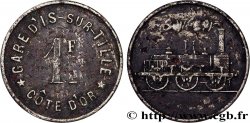E-auction 139-79357 - fjt_248548 - TRANSPORTATION (TRAINS, BUSES, TRAMS, BOATS, ETC.) INAUGURATION DU CHEMIN DE FER DE FOUGÈRES À VITRÉ 1867
You must signin and be an approved bidder to bid, LOGIN TO BID. Accounts are subject to approval and the approval process takes place within 48 hours. Do not wait until the day a sale closes to register. Clicking on « bid » constitutes acceptance of the terms of use of cgb.fr private e-auctions.
Bids must be placed in whole Euro amounts only. The sale will start closing at the time stated on the item description; any bids received at the site after the closing time will not be executed. Transmission times may vary and bids could be rejected if you wait until the last second. For further information ckeck the E-auctions F.A.Q.
NO BUYER'S FEE.
NO BUYER'S FEE.
| Estimate : | 120 € |
| Price : | 33 € |
| Maximum bid : | 35 € |
| End of the sale : | 14 December 2015 18:52:30 |
| bidders : | 6 bidders |
Type : INAUGURATION DU CHEMIN DE FER DE FOUGÈRES À VITRÉ
Date: 1867
Metal : brass
Diameter : 36 mm
Orientation dies : 12 h.
Edge : lisse
Rarity : R2
Obverse
Obverse legend : NAPOLÉON III EMPEREUR - EUGÉNIE IMPÉRATRICE - S. A. LE PRINCE IMPÉRIAL.
Obverse description : Les trois têtes tournées à gauche.
Reverse
Reverse legend : INAUGURATION DU CHEMIN DE FER DE FOUGÈRES À VITRÉ / MÉDAILLE COMMÉMORATIVE OFFERTE PAR MR DE DALMAS DÉPUTÉ PRÉSIDENT 1867.
Commentary
Le prince Napoléon Eugène Louis Jean Joseph Bonaparte, prince impérial, dit Louis-Napoléon, né le 16 mars 1856 à Paris et mort le 1er juin 1879 à Ulundi (Natal, actuelle Afrique-du-Sud), est le seul enfant de Napoléon III, empereur des Français, et de son épouse, l’impératrice Eugénie.
Appelé Louis par ses parents, il signa Napoléon après la mort de son père, le 9 janvier 1873, au lieu de Louis-Napoléon précédemment. Il fut parfois désigné sous le nom de « Napoléon IV ».
Appelé Louis par ses parents, il signa Napoléon après la mort de son père, le 9 janvier 1873, au lieu de Louis-Napoléon précédemment. Il fut parfois désigné sous le nom de « Napoléon IV ».








 Report a mistake
Report a mistake Print the page
Print the page Share my selection
Share my selection Ask a question
Ask a question Consign / sell
Consign / sell
 Full data
Full data









